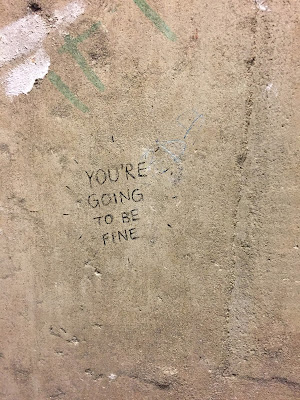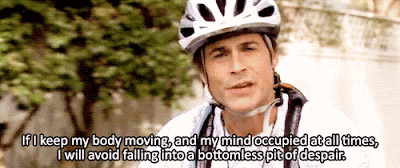Forgive me. It's been a while. While winter in Boston has marched on, I've been busy wallowing in self-pity.
42 days with no running.
A lumbar herniation aggravated by a series of foolish decisions left me with agonizing sciatic pain in my left leg. I've grown pretty accustomed to my body doing what I tell it to do. Suddenly, it simply could not. I clung to the railing and winced my way up the stairs at work. I couldn't walk to the grocery store. I couldn't sit or sleep. I realized how completely I take good health for granted and began to imagine that constant pain was simply my new normal.
And the 42 days of no running.
 |
| Hyperbole and a Half |
Running is my release. Running is a routine that grounds me. Running is a habit that gives me a sense of control when life feels turbulent. Apparently, Running is also a part of my identity to which my self-esteem is deeply tied.
In the first weeks after injury, I thought I was coping pretty well. In spite of feeling like a caged animal, I was trying hard to maintain a positive attitude. After all, this injury was not life-threatening and unlikely permanent. Just a small blip in the history of my active life.
I pedaled home from the grocery store on my bicycle one Wednesday evening in February with pain radiating up and down my spine and my left leg throbbing. My sister, husband, and friends were out together at a group run. I walked in my door, dropped my backpack and crumpled to the floor to find a position that provided some relief from pain. Before I knew what was happening, tears streamed down my cheeks. I gasped for air and wiped snot from my nose, feeling completely foolish and very much alone.
I found myself wishing for bad weather. If I couldn't run, I wanted everyone who could to feel miserable doing it. I sneered in contempt at carefree runners.
I felt guilty and embarrassed to admit that I was struggling. When I held up running next to the legitimate challenges so many people experience every day -- loss of a loved one, financial hardship, serious injury, homelessness, lack of access to healthcare or education, the list goes on -- my situation seemed trivial. But, trivial or not, I experienced this blow to my identity in a very real way.
On a Saturday morning when I typically would have gone for a cathartic long run outside, I instead hauled a water cooler, Gatorade, and snacks into the back of my sister's car on our way to set up a makeshift aid station along the Boston Marathon course. Carly works for Best Buddies, a nonprofit organization creating opportunities for one-to-one friendships, integrated employment and leadership development for people with intellectual and developmental disabilities. On this morning, it was Best Buddies' turn to host aid stations for Boston Marathon charity runners on their long training run. Carly recruited me to join her in volunteering. I poorly masked my jealousy as we set our table up at the run turnaround point on Beacon Street.
Runners began to approach our station, stopping to chat as they snacked on pretzels and refilled their water bottles. Many expressed relief when I announced that this was the point where they could turn around and run home. All all expressed gratitude for our support. The perspective from this side of the water table was surprisingly satisfying, and it filled me with appreciation. I thought of the many folks who've given up their weekend mornings to hand me a cup of water, point me around a turn on a race course, or yell for me from the sidelines. It was the least I could do to return the favor this one time.
I went for my first post-injury run one week ago. I'm cautiously optimistic, but it's going to be a slow return. It will probably have setbacks. I am grateful for my body, for my good health, and for my ability to take care of myself. I am going to be fine.





